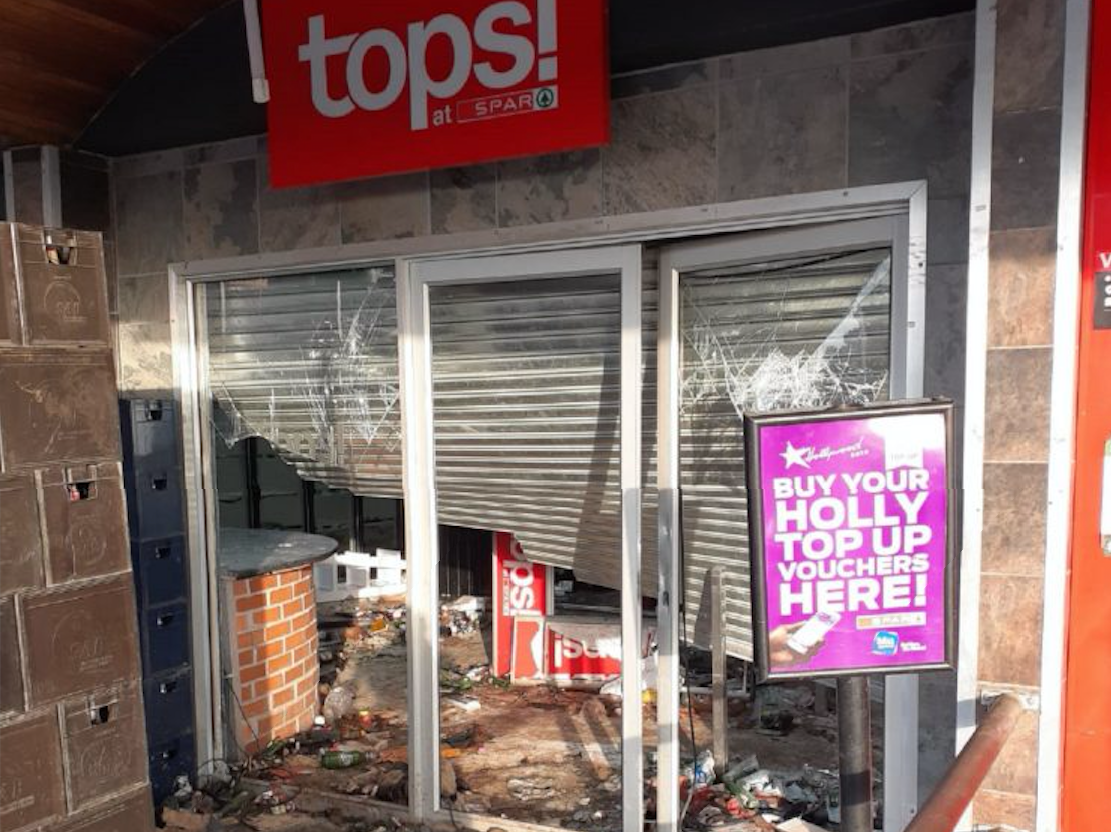28 Spar stores still closed from July unrest, some to never reopen

JSE-listed food wholesaler and distributor Spar says 28 of its format stores that were affected by the July riots remain closed.
Of 112 stores that were closed soon after the destructive events, 20 are to be reopened over the course of 2022 and eight will not reopen.
In a trading update for the 18 weeks to end January 2022, posted on Tuesday, the grocery retailer noted that the closures and subsequent scattered reopening of some of its stores had a negative impact on the group’s trading performance in its core Southern Africa business.
“Trading conditions remained challenging due to constrained consumer spending, continued high levels of unemployment and aggressive competitor behaviour,” the group said.
“Core business trading has also been impacted by the closure of stores due to the civil unrest in July 2021, some of which reopened at varying times during the period.”
Despite this, Spar did report a 5.8% increase in group turnover to R45.5 billion for the period, up from R43 billion reported in the previous comparable period.
Liquor sales boom
The group’s liquor trading brand Tops was the star performer in the period, with the unit reporting a 55.8% surge in liquor sales in comparison to the same period in its prior year.
Spar noted that its strong liquor sales performance was the main driver of the 8.2% growth in wholesale sales that it registered in its Southern Africa business.
“Following the lifting of the Covid-19 nationwide liquor trading bans in September 2021, the Tops at Spar liquor business has subsequently seen incredible levels of growth in liquor sales, with an increase of 55.8% reported for the period.
“No trading days were lost during the period, against the 58 days lost in the prior comparative period. Liquor trading for the period represents growth of 27.9% against the 2020 period.”
Underwhelming food performance
Despite the exceptional growth in alcohol sales, veteran retail analyst Syd Vianello says the group’s performance in its South African core business is nothing to write home about, especially when it is compared to its biggest competitors.
“The South African business – although some people believed it performed well, I don’t think so.”
“The grocery businesses turnover growth was just over 3% and was in fact less than inflation, which means that their volumes were slightly down, compared with a year ago,” Vianello tells Moneyweb.
He says that when Spar’s performance is compared to that of the Shoprite Group’s grocery retailers – Shoprite (7.3%) and Checkers (11.4%) – which saw substantially higher sales growth, it is clear that Spar lost market share during the period.
Vianello adds that Shoprite Group’s Checkers delivery offering Sixty60 has placed mounting pressure on market competitors like Spar, Woolworths and Pick n Pay.
“It is clear that the Shoprite Checkers group have picked up market share, not only from Spar but from everybody else in the industry as well,” he says.
“A lot of that market share has come from the Sixty60 delivery system that Checkers has mastered to a ‘T’. Compared to their competitors who, in the case of Pick n Pay and Woolworths, are actually really trying to get into the business.”
Spar’s e-commerce play
Spar, which has its headquarters in Pinetown in KwaZulu-Natal, has finally launched the pilot phase of its SPAR2U e-commerce platform and plans to have it available for use in parts of Johannesburg by the end of March.
Vianello says it will be difficult for the group to catch up with its competitors because of the different franchise model it operates.
However, he says that for Spar to remain competitive, it needs to start accelerating efforts to tap into the home delivery market.
“They have to find a way around the home delivery issue in South Africa. It’s not something that you can live [without] forever.
“If the home delivery concept is going to grow and Spar is not part of that growth, their business is going to struggle to gain or even retain market share going forward.”
Out of SA operations
Spar’s BWG Foods, which is located in Ireland and South West England, reported an overall strong performance.
Its Irish business reported a rise in turnover of 6.9% for the period, boosted by overall strong performance across its retail brands, despite the reintroduction of lockdown restrictions in November 2021.
On the other hand, Spar’s Switzerland business – which is built around a convenience store model – saw a turnover increase of just 1.9%.
However, the Swiss business faces uncertain growth prospects as it has reported a “slowdown in the extraordinary levels of support of local community stores experienced in the prior comparative period”. This comes as more consumers return to supermarkets to do their grocery shopping, following the easing of Covid-19 restrictions.
Spar Poland reported a stronger performance, with 11.8% turnover growth (in Polish złoty or PLN-denominated currency terms). The group has also announced that it is in the process of negotiating new contracts with Spar retailers and this process is expected to be completed by June.
Vianello believes this is another Spar business that is facing an uncertain future as it is yet to break-even since Spar bought its 80% stake in the business in 2019.
However, Spar did say that it expects the business to breakeven by 2023.
“Of course they [Spar] know what they are doing – they have been doing this successfully in South Africa and in other parts of Europe – it’s just a question of how long will it take to get that business to start making money and for how long will we have to endure the pain,” says Vianello.

